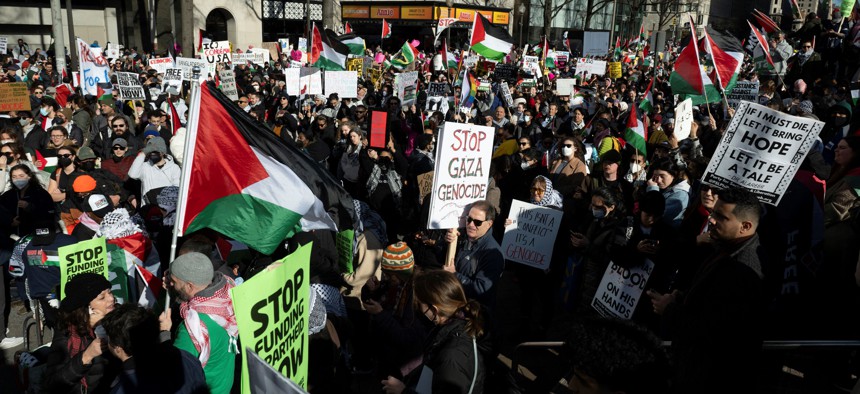3 actions for cities fighting antisemitism and Islamophobia

Protesters rally during the "March on Washington for Gaza" in Washington, DC, on January 13, 2024. ROBERTO SCHMIDT / AFP) (Photo by ROBERTO SCHMIDT/AFP via Getty Images
Mayors met last week to discuss how to deal with an increase in hate crimes amid the war in Gaza.
Dozens of mayors, who gathered last week to discuss how to deal with the disturbing increase in antisemitic and Islamophobic hate crimes amid the war in Gaza, went back home armed with a number of actions to take. A top Justice Department official suggested cities start by keeping track of just how many hate crimes are occurring.
The official, Deputy Associate Attorney General Saeed Mody, said a surprising number of police departments do not track hate crimes against Jews and Muslims. Twenty-five departments serving populations of more than 100,000 did not report to the federal government at all, and several other departments said there were no hate crimes in their cities, Mody told more than 40 city leaders at the U.S. Conference of Mayors winter meeting in Washington, D.C. last week.
Not accurately keeping track, he said, “sends a message to the impacted communities that these crimes don't matter.”
The number of antisemitic incidents has more than tripled since Hamas attacked Israel on Oct. 7, according to the Anti-Defamation League. The group has counted 3,300 antisemitic incidents in the U.S., an average of 34 a day, since the outbreak of the war.
“These include harassment, assault, vandalism and rallies where antisemitism sentiments are being expressed,” said Alex Friedfeld, the league’s associate director of investigative research. “This is not just a blip on the radar. This is part of a broader surge that is happening.”
While no similar data is available, Friedfeld said, Muslims around the country are also facing increased levels of prejudice and violence “because of their beliefs and the perceived connection to things that are happening overseas.”
Burlington, Vermont, Mayor Miro Weinberger recounted the Nov. 25 shootings of three Palestinian students on a city street. Police still have not learned the motive behind the attack, but “the weeks following the shootings have been challenging,” Weinberger said. Both Jews and Muslims have “expressed the feeling of being unsafe.” It is not just the shooting that is triggering the fear, he added, but “the divisive rhetoric” being spewed around the country.
Weinberger recommended that city leaders develop relationships with their Jewish and Muslim communities in order to learn the best ways to help them. When the shooting occurred in Burlington, Weinberger said, he felt fortunate that he already had a relationship with the head of the city’s Islamic society, “who I had gone to prayers with.”
It is important to create unity in communities against hate, Weinberger said. Burlington, for instance, is following the lead of New York City, which launched a public service campaign to quell anti-Arab sentiments after the 9/11 attack on the World Trade Center.
The 2016 campaign "I am Muslim. I am NYC" showed photographs of Muslims in New York on social media to stress that they are fellow New Yorkers. A rally the following year at Times Square by a coalition of religious groups and Def Jam Records founder Russell Simmons also showed solidarity with Muslims.
Weinberger said Burlington has hired artists to launch a “robust” social media campaign, which will be “sort of similar to the ‘I'm a Muslim. I am NYC’ campaign.”
Canton Township, Michigan, Supervisor Anne Marie Graham-Hudak said the small but diverse suburb also stressed unity after 9/11. Religious groups came together to emphasize unity by celebrating each other's holidays and sharing foods from their cultures.
“Food is a big one,” she said. “It calms people down. Opens people up.”
Graham-Hudak added, “People come from the outside to try and start things. The groups stand together and say, ‘Hey, we don't want this in here.’”
Melanie Maron Pell, chief field operations officer for the American Jewish Committee, suggested that mayors looking to bring different groups in their communities together start by organizing a small meeting. A large event would attract “a lot of people that will immediately try to disrupt,” she said. “Their goal is to disrupt and divide.”
“I would say find people that you trust,” she continued. “Start small and if you’re all in agreement, you can decide what would a public conversation look like.”
A mayor does not have to take responsibility for leading the discussion, Pell said. “You can be there to offer opening and closing thoughts about why this matters to the community.”
Meanwhile, Mody of the Justice Department told the mayors to look for another round of grants in the spring. The department gave out $17 million last year to investigate and prosecute hate crimes, as well as to improve reporting of crimes. With the funds, for instance, Nevada is creating a state-run hate crime reporting hotline.
In addition, Mody told mayors that the Justice Department’s Community Oriented Policing Services office is available to recommend how state and local agencies can “preserve people's right to peaceably assemble while maintaining public safety.”
Kery Murakami is a senior reporter for Route Fifty, covering Congress and federal policy. He can be reached at kmurakami@govexec.com. Follow @Kery_Murakami
NEXT STORY: How tech can democratize community engagement






